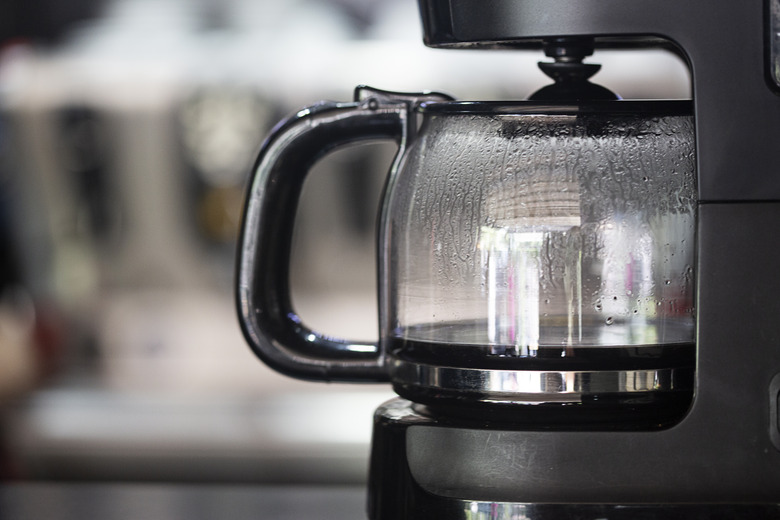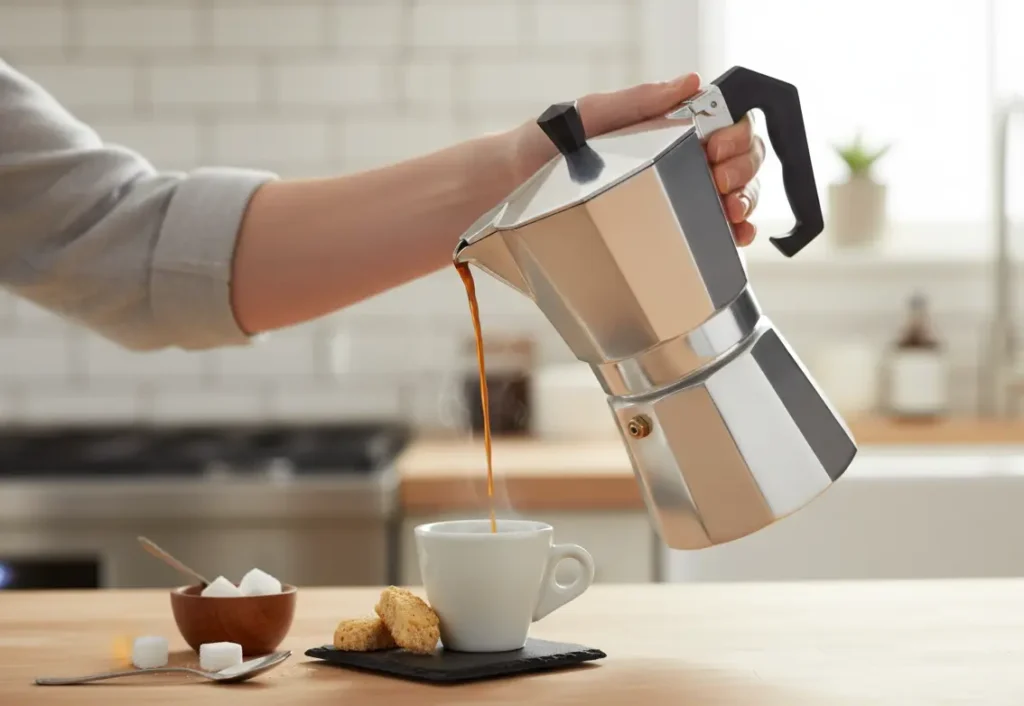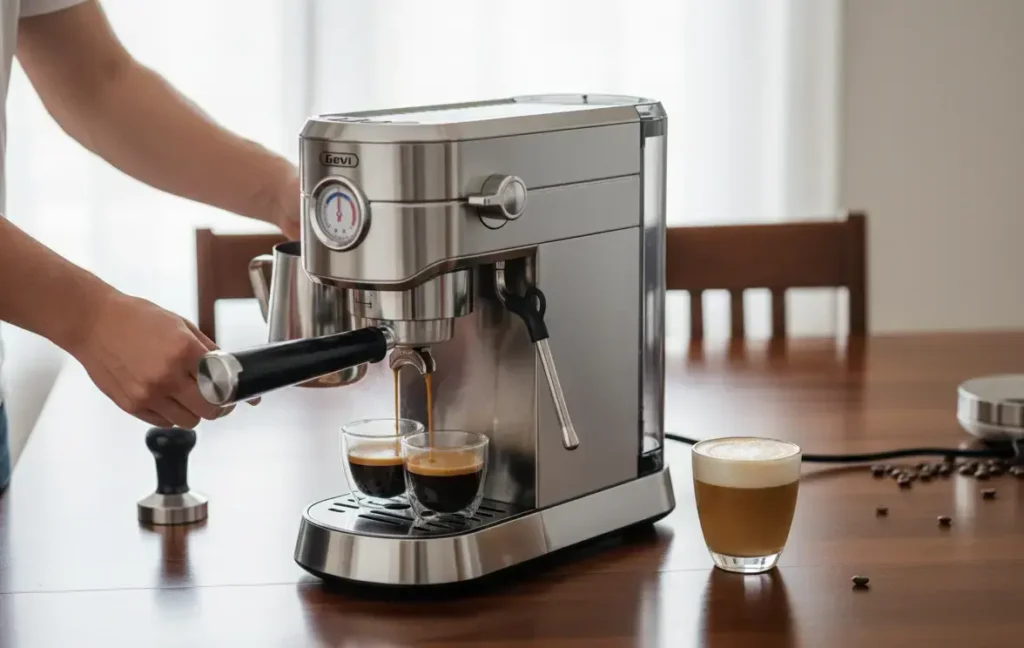You rely on your coffee maker every day to brew that perfect cup of coffee. But when it comes to cleaning it, you might wonder: is it safe to use bleach?
After all, bleach is a powerful disinfectant used in many household cleaning tasks. However, using bleach in your coffee maker could do more harm than good—for both your health and your machine. If you want to keep your coffee maker clean and safe without risking damage or toxic residue, you need to know the facts.
Keep reading to discover why bleach is not the best choice and learn the safest, most effective ways to clean your coffee maker so every cup tastes fresh and pure.

Credit: www.hunker.com
Risks Of Using Bleach
Bleach leaves toxic residue inside the coffee maker. This residue can mix with your coffee and cause health problems if swallowed. The strong chemicals in bleach can damage the machine’s parts, leading to leaks or breakdowns. Bleach fumes are dangerous to breathe and may irritate your eyes and lungs.
Bleach also does not remove hard water deposits well. These deposits, called calcium buildup, need acid to break down. Bleach is a base, so it can make the problem worse or leave deposits behind. Using bleach risks both your health and your coffee maker’s life.
Why Bleach Is Not Recommended
Bleach is a strong chemical that can harm your coffee maker. It may leave dangerous residues inside the machine. These residues can mix with your coffee and cause health problems.
Bleach can also damage the parts of the coffee maker. The harsh chemicals might break seals or corrode metal pieces. This can make the machine stop working properly.
Bleach does not remove calcium deposits well. Both bleach and these deposits are bases, so bleach can make the problem worse. It is not effective for cleaning scale buildup.
| Cleaning Method | Effectiveness | Safety |
|---|---|---|
| Bleach | Poor for descaling | Leaves toxic residue, can harm machine |
| White Vinegar and Water | Good for cleaning and descaling | Safe, no harmful residue |
| Commercial Descaling Solutions | Very effective for scale removal | Designed for coffee makers, safe if used as directed |
Safe Cleaning Alternatives
White vinegar mixed with water cleans coffee makers safely. This solution removes mineral build-up and kills germs without harmful chemicals. Use equal parts vinegar and water in the water reservoir. Run a full brewing cycle to let the mixture work inside the machine.
Commercial descaling products are also good choices. These products are made to clean coffee machines and remove hard water deposits. Follow the instructions on the package for best results. They are safe and effective.
After cleaning, rinse well by running two or more full cycles with fresh water. This step removes any leftover vinegar or cleaner. Proper rinsing keeps your coffee tasting fresh and stops any cleaning smell from remaining.

Credit: www.clorox.com
Step-by-step Cleaning Guide
Start by emptying the coffee maker and removing all filters. Fill the water reservoir with a mixture of equal parts white vinegar and water. This solution helps to break down mineral buildup and sanitize the machine safely.
Turn on the coffee maker and let it run a full brewing cycle. This allows the vinegar solution to clean inside the machine thoroughly. Once the cycle finishes, discard the vinegar mixture.
Rinse the carafe and brew basket well with warm water. Then, run at least two full cycles with fresh water only to clear out any vinegar taste or smell. This step is crucial to keep your coffee tasting fresh.
Remove all parts that come off easily, like the carafe lid and filter basket. Wash these parts with warm soapy water to remove any leftover residue. Dry them completely before reassembling the coffee maker.
Tips For Maintaining Coffee Makers
Cleaning your coffee maker regularly keeps it working well. Aim to clean it every 1-3 months depending on use. This helps stop mineral buildup that can block water flow and affect taste.
Use a mix of equal parts white vinegar and water to remove minerals safely. Run this solution through a brew cycle, then run plain water cycles to rinse. Avoid harsh chemicals like bleach, which can damage the machine and leave toxic residue.
Always unplug the machine before cleaning to stay safe. Clean removable parts with warm, soapy water. Regular care extends the coffee maker’s life and keeps coffee tasting fresh.

Credit: yayamarias.com
Frequently Asked Questions
Can I Use Bleach To Clean My Coffee Maker?
Do not use bleach to clean your coffee maker. Bleach can damage the machine and leave toxic residues. Use equal parts white vinegar and water or a commercial descaling solution instead. Run a full cycle, then rinse with fresh water to remove any residue safely.
How To Sanitize A Coffee Maker?
Empty old grounds and filters. Fill reservoir with equal parts white vinegar and water. Run a brew cycle halfway, then pause. Let sit 30 minutes, then complete cycle. Discard solution, rinse carafe and basket. Run two full cycles with fresh water to remove vinegar taste.
What Is The Best Thing To Clean A Coffee Machine With?
Use a solution of equal parts white vinegar and water or a commercial descaling product. Run a brew cycle, then rinse with fresh water to clean and descale effectively. Avoid bleach as it can damage the machine and leave harmful residues.
Can Bleach Take Out Coffee Stains?
Bleach can remove coffee stains but may damage fabric or surfaces. Use diluted bleach carefully and test first. For safer stain removal, try baking soda or vinegar.
Is Bleach Safe For Cleaning Coffee Makers?
Bleach is unsafe for coffee makers; it can damage parts and leave toxic residue.
Conclusion
Cleaning a coffee maker with bleach is not safe. Bleach can harm your machine and leave toxic residue. This residue may cause health problems if ingested. Vinegar or commercial descaling solutions clean effectively without risks. Always rinse your machine well after cleaning.
Keeping your coffee maker clean ensures better taste and longer life. Choose safe, simple methods for your routine maintenance. Your health and coffee’s flavor depend on it.

Hi, I’m Joshua Miller, a U.S.-based food lover, review writer, and Co-founder of KitchenWink.com. I hold a Bachelor of Science in Food Science and Culinary Technology, and for over five years I’ve been testing kitchen gadgets like air fryers, blenders, and other cooking tools.
I’m also a home cook, so every product I review is tried in real kitchens—not just in theory. My reviews are based on real results, simple fixes, and tips that anyone can use. With both formal training and hands-on testing, I make sure my advice is clear, honest, and practical.
My goal is simple: to help home cooks choose the right tools and make cooking easier every day.




